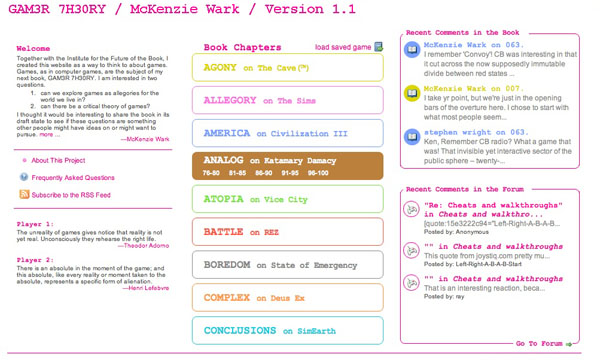
The Institute has published its first networked book, GAM3R 7H30RY 1.1 by McKenzie Wark! This is a fascinating look at video games as allegories of the world we live in, and (we think) a compelling approach to publishing in the network environment. As with Mitch Stephens’ ongoing experiment at Without Gods, we’re interested here in a process-oriented approach to writing, opening the book up to discussion and debate while it’s still being written.
Inside the book, you’ll find comment streams adjacent to each individual paragraph, inviting readers to respond to the text on a fine-grained level. Doing the comments this way (next to, not below, the parent posts) came out of a desire to break out of the usual top-down hierarchy of blog-based discussion — something we’ve talked about periodically here. There’s also a free-fire forum where people can start their own threads about the games dealt with in the book or about the experience of game play in general. It’s also a place to tackle meta-questions about networked books and to evaluate the successes and failings of our experiment. The gateway to the forum is a graphical topic pool in which conversations float along axes of time and quantity, giving a sense of the shape of the discussion.
Both sections of GAM3R 7H30RY 1.1 — the book and the forum — are designed to challenge current design conventions and to generate thoughtful exchange on the meaning of games. McKenzie will actively participate in these discussions and draw upon them in subsequent drafts of his book. The current version is published under a Creative Commons license.
And like the book, the site is a work in progress. We fully intend to make modifications and add new features as we go. Here’s to putting theory into practice!
(You can read archived posts documenting the various design stages of GAM3R 7H30RY 1.1 here.)
if:book
A Project of the Institute for the Future of the Book

Congratulations! it looks/reads amazing.
At first I thought McSweeney’s had collided with Second Life. Pretty interesting format–I’d like to write a piece in a form like this. I think. I appreciate Wark’s efforts, and am intrigued by the form, but as a non-gamer I’ll reserve comments on the prose. I’m assuming it’s written within the genre.